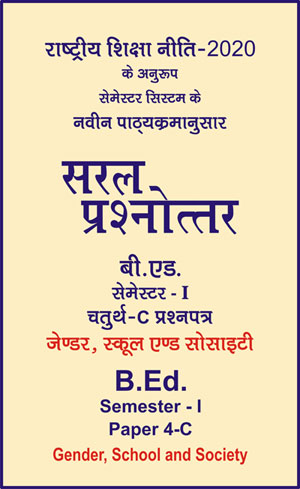|
बी एड - एम एड >> बी.एड. सेमेस्टर-1 प्रश्नपत्र-IV-C - जेण्डर, स्कूल एण्ड सोसाइटी बी.एड. सेमेस्टर-1 प्रश्नपत्र-IV-C - जेण्डर, स्कूल एण्ड सोसाइटीसरल प्रश्नोत्तर समूह
|
|
||||||
बी.एड. सेमेस्टर-1 प्रश्नपत्र-IV-C - जेण्डर, स्कूल एण्ड सोसाइटी (अंग्रेजी भाषाा में)
Question- Who can file a complaint of domestic violence?
Related Short Answer Questions
-
To whom can I file a complaint of domestic violence?
-
What are the rights of a victim of abuse?
Answer -
Any person can give information about whether domestic violence has been done or is about to be done or is being done, for which no responsibility will be fixed on the informer. As a victim, you can approach the ‘Protection Officer’ or ‘Service Provider’ under this law. A ‘protection officer’ is the first point of contact for the victim. The Protection Officer can help initiate proceedings before a magistrate and provide a safe haven or medical aid. Each state government appoints a Protection Officer in its state. ‘Service Provider’ is an organization that works to help women and is registered under this law. The victim can approach the service provider to register her complaint or get medical help or a safe place to live. A database of all registered security officers and service providers in India is available here. The police officer or magistrate can also be contacted directly. You can also approach a Magistrate – First Class or Metropolitan Magistrate, but which area magistrate to approach depends on you and the place of residence of the respondent. Cities with a population of more than 1 million may generally need to approach the Metropolitan Magistrate.
If any information of domestic violence is given to any police officer or protection officer or magistrate, then the victim has to be informed as to how she is being abused and who is torturing her. She also has the following rights :
(a) to get protection order
(b) service provider’s service
(c) protection officer’s service
(d) free legal aid
(e) to file complaint is entitled. But this provision does not prevent the police from taking action for a cognizable offence.
|
|||||

 i
i 









